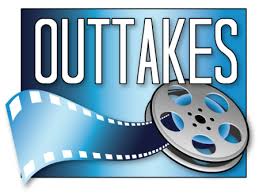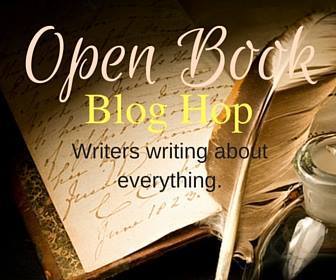Welcome to another BlogHop, with #OpenBook. Here’s this week’s prompt.
What did you edit out of your most recent book? (or another book…let’s see those outtakes!)

That’s a difficult question to answer. The way I write kind of makes it redundant, or irrelevant.
I don’t edit like that.
Let me explain.
Once I get an idea for a story, I see what I can only describe as a film of the action as it unfolds. It used to be confined to my dreams, now it seems to happen at any time. I can rewind it and slow it down, pause if I need to. I just write what I see, as I see it. The one thing I can never do is fast forward, it all plays out in real-time.
In the same way that none of us can see tomorrow with certainty, I never know what will happen next. I don’t even know that I’m reaching the end of a story until I get there.
I know, it sounds weird, you should have been me when it first started. Now, I’m used to it.
The other thing that this means is that I can’t really write stuff and then find that it’s not required. As I only write what I see, it would be like editing a DVD before you watched it, or skipping bits while you were sat on the sofa with the popcorn (other snacks are available).
So why am I writing this post, when clearly the subject is not for me.
Maybe it’s because whatever process is showing me the action is doing the editing for me. I’m editing it before I write. Which means that the out-takes are all in my head somewhere. Whatever your thoughts on where an authors inspiration and creativity comes from, it’s plain that I don’t see the whole story. Taking the film analogy again, there is always more detail in the book than in the film of the book. In the same way, there’s more to what I see than what I write.
When I read back, which I do quite a bit, I will often see things that need more clarification, which is where I rewind the film and have another look. Rarely do I take anything away, all I usually do is explain it better.
During this process, I often find places where I realise that another story could be developed from a comment or scenario. Not necessarily connected to the story I’m involved in, while it might be a sequel or prequel, it could be a whole new project.
The strange thing is, once I see one of these, I very often get another film starting in my head, of how that story plays out.
Perhaps they’re the out-takes, being recycled in another form. Here’s an example of what I mean.
In my novel Ribbonworld, I invented a farm in space, an idea which led me to write a short story called The Orbital Livestock Company. This, in turn, formed part of the setting for Andorra Pett and the Oort Cloud Café.
All in all, I accept that it appears to be a weird way of working. I have no idea why some part of my creative mind is arranging things like this, I’ve tried fighting it with little success, so now I just go with the flow. I really don’t know what else to do.
Psychologists would probably tell you that there’s enough material in the last few paragraphs for a whole conference.
Let me know what you think by commenting below, then check out what everyone else on the BlogHop has to say.
I’ll be back on Thursday with another Indie Showcase.



Lela Markham
I used to wonder if I was crazy, but then I worked for community behavioral health and I’ve now known enough counselors to be fairly assured that as long as you know the difference between what is real and what is in your head, you’re okay. One of our psychiatrists did say that when he was a “baby doctor” he kind of thought he would discover novelists are crazy, but 20 years in the business had convinced him that we aren’t.
I do something similar when I’m on the first draft. It’s a lot like a movie (or three) that plays out in real-time and then I get to cut and paste them into the different character streams and move stuff around on the rewrite. But I think when I used to write for my own amazement 20 years ago, I think I was pretty wedded to keeping everything and just clarifying. It was just a hobby and it didn’t matter. Then I showed my writing to someone and they bled red ink all over the pages and I started to adjust my production process.
Richard Dee
It was such a relief to find that other writers worked in the same way. My novel Life and Other Dreams is based on a man who sees another life in his head. I figured that if it was happening to me, I might as well use it.
P.J. Maclayne
My writing isn’t nearly as “dictated” as yours, but it often gives me ideas for other stories. Enough that when someone asked me to join a group that meets occasional to write to a given writing prompt, I turned the offer down. I have too many of my own ideas to spend time writing around someone else’s!
Richard Dee
I have so many half-finished projects. No matter how fast I write, the number never decreases.
Roberta Eaton
I found this post quite intriguing. My writing process is quite an effort and involves a lot of research and thinking. I do a lot of re-writing and editing.
Richard Dee
Thank you. I do a lot of fact-checking research, just to make sure that I’ve understood what I’ve seen and written it correctly. I must admit to feeling a certain guilt at skipping all the hard work that I know other writers put into plotting.
Amy
I have the movie thing going while I’m writing, too!
Richard Dee
There are so many of us that work in this way, it makes me feel so much better. I thought I was going crazy at first!
Jeanette Ford
Isn’t it interesting how we writers function in our own individual ways? My books usually start with a picture or scene suddenly entering my head. I usually write it down as I see it and then the story starts to form around it. Often, it’s the opening chapter, occasionally, it appears later in the book. But, once started, my story starts to perform in front of me and I also see it as if it was a movie. But then, that’s also how I read books – as I read, I can see the whole things being played out. I often think that’s why we’re writers, because we can see so clearly when we read. My sister once told me she never reads books written in the first person, because she can’t relate to being that person. I am the opposite; however it’s written, I’m there inside it.
Richard Dee
I recently had the weird (for me) experience of seeing the middle of a story first, it feels strange to work in two directions. Some stories only make sense in first person, others need third to exist